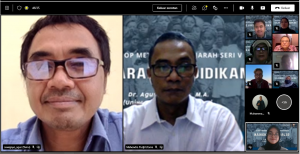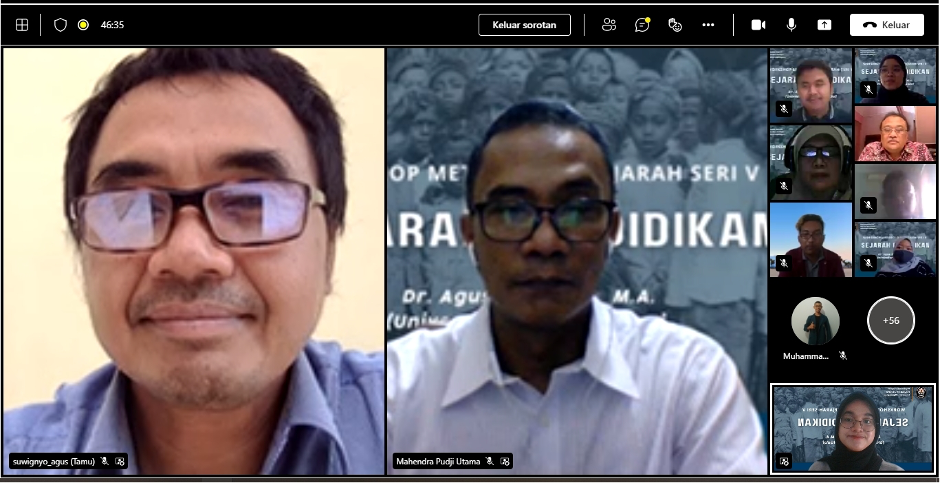Semarang, the Department of History, Faculty of Cultural Sciences, Diponegoro University, on March 12, 2022, held a Series V History Methodology Workshop with the significant theme History of Education. On this occasion, Dr. Dhanang Respati Puguh, M. Hum. as Head of the History Department, said that the History Department deliberately initiated this workshop to enrich the vocabulary of undergraduate thesis topics for Undip History students. Since 2020, similar workshops have been held on various themes, including environmental history, biography, cultural history, visual history, and urban history.
With an abundant track record of scientific publications related to the history of education, which have been published in various reputable international journals, such as the Journal of Southeast Asian Studies, Bijdragen tot de Taal-, land-en volkenkunde, History and Education, and others, it is very appropriate that The Undip History Department invited Dr. Agus Suwignyo, M.A. from Gadjah Mada University (UGM) as a speaker on this occasion.
“We will start our conversation about the history of education with a question. ‘Is there any particularity to the theme of educational history? Or is it just a combination of history and education?'” explained the UGM lecturer, who often shares his research in the daily Kompas.

Workshop moderated by Mahendra Pudji Utama, S.S., M. Hum. This is a valuable space to discuss the interaction of historical studies with education. The study of the history of education can be traced from various approaches because it has a broad spectrum. The process of studying the history of education can be based on something other than the science of education or teaching because education is a cultural spectrum. Schools and classrooms are part of a community that has unique subsystems. Education is a cultural spectrum containing political, economic, social, and educational dimensions. Apart from that, distinctive elements surround this study, especially in terms of methodology.
On this occasion, Dr. Agus explained about the scope of education as a spectrum of culture and even politics, which cannot be separated from material (tangible) and non-material (intangible) elements. For example, the curriculum can not only be seen as a tangible material object and become an educational instrument, but further than that, the curriculum can be a reflection of a certain larger political view of education.
“The curriculum may be born from the process of negotiating power so as to reach a compromise that is formulated in the curriculum. Of course, we cannot focus only on the content of the curriculum without completing the context that encloses the curriculum. Apart from that, textbooks also reflect a certain political view of the time.” said Dr. Agus.
Thus, the history of education does not exist in a vacuum. The schooling process always exists in a wider context. Therefore, the history of education can use approaches to politics, public policy, economics, science, sociology, psychology, anthropology, philosophy, and others. For example, research on Taman Siswa schools from an economic perspective. How did Taman Siswa survive despite not being cooperative with the Dutch colonial government, while many schools were shaky due to shaky funding sources. How Taman Siswa was born from the study of economic theory became a very interesting discourse. Reviews of Taman Siswa are not only seen from the tangible elements of schooling as the major narratives develop, but can be seen from various approaches and methodologies. Therefore, understanding the history of education only from the schooling spectrum will make historical historiography very dry.
As another example, can a tangible schedule reflect a particular cultural or political dimension. This can be read in the schedule of subjects at school. In 1914, the Dutch colonial government always placed religious lessons outside school hours, namely after 12:45. The new religious lesson begins at 14.00 noon. As in the implementation of religious teaching at the Jetis High School in Yogyakarta, where K.H. Ahmad Dahlan had been a religious teacher there. “From the case of subjects, we can read with another framework, which transports the scope of politics and policies with sociological nuances.” explained Dr. Agus.
